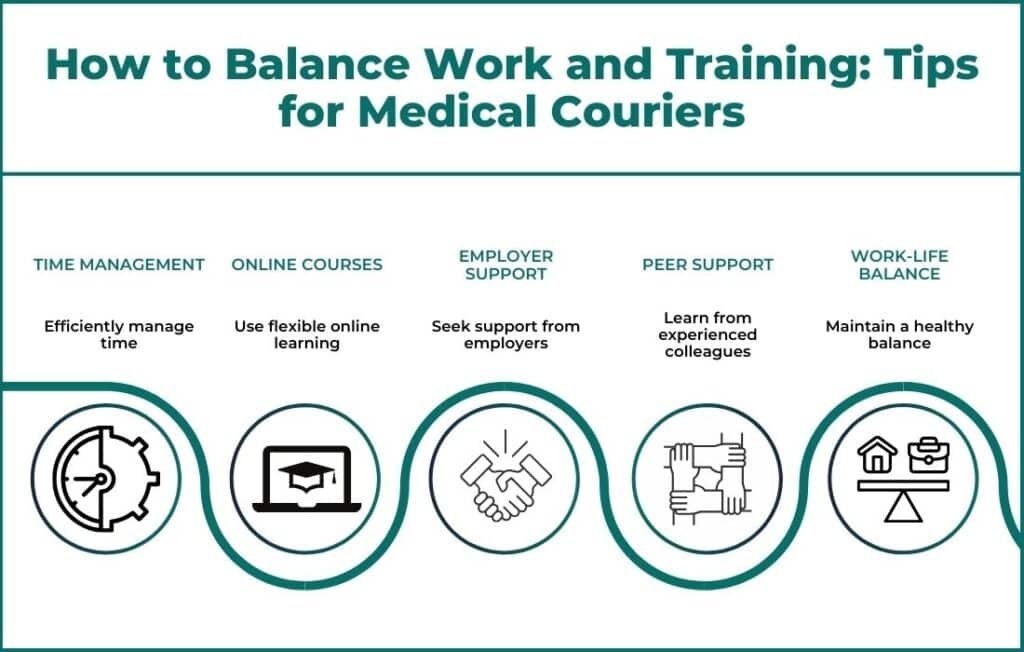The Medical Couriers Training in Alameda is constantly evolving, influenced by advancements in technology, changes in regulations, and the needs of the industry. This article serves as a comprehensive guide for medical couriers in Alameda.
It emphasizes the significance of continuous training, regulatory requirements, available local and online resources for training, industry best practices, and evaluation metrics. The objective is to provide medical couriers with the necessary knowledge and tools to thrive.
The Importance of Continuous Medical Couriers Training in Alameda
Continuous training is essential for medical couriers in Alameda. It plays a crucial role in ensuring the safe and efficient delivery of medical supplies and specimens. Ongoing education helps couriers remain compliant with regulations and best practices and equips them with the necessary skills to handle emergencies effectively.
- Safety Protocols: Understanding the latest safety protocols is essential for reducing risks during transit.
- Regulatory Compliance: Continuous training ensures couriers align with local and federal laws.
- Efficiency: Updated training programs can introduce couriers to new technologies and methods that make their work more efficient.
- Customer Service: Training can also include customer service skills, which are crucial when interacting with healthcare providers.
- Emergency Handling: Knowing how to manage emergencies can significantly affect medical logistics.
- Skill Upgradation: Continuous training allows couriers to upgrade their skills, making them more valuable to employers.
- Job Satisfaction: Well-trained employees are generally more satisfied and committed.
Regulatory Requirements for Medical Couriers Training in Alameda

In Alameda, medical couriers must follow specific regulatory requirements. These regulations outline the scope and frequency of their training, ensuring optimal safety and efficiency in medical logistics. Failure to comply with these regulations can lead to penalties and even the revocation of operating licenses.
| Requirement | Description | Consequences of Non-Compliance |
| HIPAA Compliance | Ensures patient confidentiality | Fines, Legal Action |
| Transport Regulations | Follows DOT guidelines | Fines, License Revocation |
| Local Laws | Adherence to Alameda-specific regulations | Fines, Legal Action |
| Certification Requirements | Specialized certifications for certain deliveries | Fines, Legal Action |
| Audits and Inspections | Regular checks for compliance | Fines, License Revocation |
Local Training Programs and Courses Available for Medical Couriers
Alameda provides a wide range of local training programs and courses specifically catered to medical couriers. These programs offer practical experience and are customized to address the unique requirements of the local healthcare system. Moreover, they facilitate networking opportunities with local healthcare providers.
- Community Colleges: Some community colleges offer specialized courses for medical couriers.
- Healthcare Partnerships: Local healthcare providers may offer in-house training programs.
- Workshops: Short-term workshops focusing on specific skills can be very beneficial.
- Online vs. In-Person: Many programs offer online and in-person training options.
- Accreditation: Look for programs that are accredited to ensure quality education.
- Networking: These local programs often provide opportunities to network with local healthcare providers.
- Financial Aid: Some programs may offer financial aid or scholarships to eligible students.
Online Training Resources: A Flexible Option for Busy Couriers

Online training resources offer a convenient and flexible way for medical couriers in Alameda to stay updated. These platforms allow couriers to learn at their own pace, making it easier to balance work and training. They also provide various courses, from essential to advanced levels.
- Self-Paced Learning: Online courses often allow for self-paced learning, accommodating busy schedules.
- Course Variety: Online platforms offer various topics from basic safety protocols to advanced logistics.
- Certification: Many online courses offer certification upon completion, which can be valuable to a resume.
- Accessibility: Online training can be accessed from anywhere, making it convenient for couriers on the go.
- Cost-Effectiveness: Online courses are often less expensive than traditional in-person training.
- Updates: Online platforms usually update their content quickly, ensuring the latest information is available.
- Interactive Learning: Many online courses offer interactive modules, quizzes, and real-life scenarios for better understanding.
The Role of Alameda Health Departments in Medical Courier Training
The role of Alameda’s health departments in shaping the training landscape for medical couriers is significant. They establish guidelines, provide training programs, and conduct audits to ensure adherence. Through their active involvement, these departments equip couriers with the necessary skills to tackle the unique challenges of medical logistics in the region.
- Setting Guidelines: Health departments often release guidelines that become the standard for training programs.
- Accreditation: They may also accredit training programs, ensuring a certain level of quality.
- Audits and Compliance: Health departments conduct audits to ensure training compliance.
- Public-Private Partnerships: Collaborations with private companies can result in more comprehensive training programs.
- Resource Allocation: Health departments may offer resources like manuals, online courses, and workshops.
- Community Outreach: They often hold community events to raise awareness about the importance of proper training.
- Feedback Loop: Health departments can provide a feedback platform, helping improve training standards continuously.
Best Practices for Medical Couriers: What’s New in the Industry?
To remain competitive and efficient, medical couriers must stay updated on industry best practices. This involves staying informed about new techniques and methods and continually developing protocols. By staying aware of these changes, couriers can gain an advantage in their profession.
| Best Practice | Description | New Trends Impacting Practice | Benefits of Adopting New Trends |
| Technology Updates | Keeping up with the latest technologies like GPS tracking | IoT, Blockchain | Enhanced tracking, security |
| Sustainability | Adopting eco-friendly practices | Electric Vehicles | Reduced carbon footprint |
| Data Analytics | Using data to optimize routes and improve efficiency | AI-driven analytics | More efficient operations |
| Patient-Centric Approach | Focusing on the needs of the patient in all logistics | Telemedicine integration | Improved patient satisfaction |
| Global Standards | Understanding and implementing global best practices | International certifications | Competitive edge globally |
| Automation | Incorporating automated systems for sorting, tracking, etc. | Robotics | Reduced manual errors |
| Industry Publications | Regularly reading industry journals and publications | Online webinars | Staying updated with the latest info |
How to Balance Work and Training: Tips for Medical Couriers

Balancing the demands of a job while juggling ongoing training can pose challenges for medical couriers. However, effectively managing time and setting priorities makes it feasible to handle both responsibilities.
Additionally, employers can contribute to this balance by offering flexible training schedules and providing necessary resources.
- Time Management: Effective time management is crucial for juggling work and training commitments.
- Online Courses: Opting for online courses can provide the flexibility to learn during off-hours.
- Employer Support: Employers can offer on-the-job training or allocate time for external courses.
- Prioritizing: Knowing which skills are most crucial can help prioritize training modules.
- Peer Support: Learning from experienced colleagues can be an invaluable resource.
- Work-Life Balance: Maintaining a healthy work-life balance while pursuing training is essential.
- Short Courses: Opt for short, intensive courses that provide a lot of value in a short time.
The Future of Medical Courier Training: Trends to Watch
The landscape of medical courier training is constantly evolving due to technological advancements, regulatory changes, and industry demands. By staying updated on these trends, couriers can be prepared for future challenges and seize new opportunities. Exciting possibilities await in the form of virtual reality training and AI-driven logistics.
- Virtual Reality: VR training modules can offer realistic, immersive training experiences.
- AI and Machine Learning: These technologies are set to revolutionize training methodologies.
- Remote Monitoring: Future training may include real-time remote monitoring for instant feedback.
- Sustainability: Eco-friendly practices will likely become a significant focus in future training.
- Globalization: Training may include international best practices as the industry becomes more global.
- Regulatory Changes: Keeping an eye on upcoming regulatory changes is crucial for future compliance.
- Personalization: Training programs may become more personalized, adapting to individual learning styles and needs.
Evaluating the Effectiveness of Your Training Program: Metrics and Feedback
Measuring the effectiveness of a training program is crucial for continual improvement. Valuable insights can be gained by evaluating completion rates, test scores, and on-the-job performance metrics. Additionally, gathering feedback from participants is essential for making necessary program adjustments.
| Metric | Description | Method of Measurement | Importance |
| Completion Rates | Percentage of participants who complete the training | Tracking software, Attendance | Indicates engagement |
| Test Scores | Scores achieved in post-training assessments | Exams, Quizzes | Measures retention & understanding |
| On-the-Job Performance | Performance metrics post-training | KPIs, Supervisor feedback | Shows real-world impact |
| Feedback Surveys | Participant feedback on course content, delivery, etc. | Online surveys and interviews | Provide qualitative insights |
| Cost-Benefit Analysis | Financial returns vs. cost of the training program | Financial records, ROI calculation | Justifies investment |
| Adaptability | Ability of the program to adapt to new industry trends and regulations | Course updates, Flexibility | Ensures long-term relevance |
| Employer Feedback | Feedback from employers on how well the training prepares couriers for the job | Employer surveys, Interviews | Validates training effectiveness |
Medical training is essential to the effectiveness and success of medical couriers working in Alameda. It guarantees adherence to regional and federal rules and gives participants the knowledge and abilities to understand market changes and technology advancements. This article offers best practices and guidelines to help medical couriers based in Alameda meet existing and future issues in the dynamic medical logistics field.
Don’t leave your professional development to chance. Contact the team to book a consultation with experts at Aceso Courier to discuss personalized training programs, compliance requirements, and career growth opportunities tailored to your needs.
Frequently Asked Questions
What are the basic regulatory requirements for medical courier training in Alameda?
Medical couriers in Alameda are required to abide by HIPAA regulations, follow Department of Transportation (DOT) guidelines, and adhere to any local laws specific to Alameda. Explanation: The improved version simplifies
Are there any local training programs in Alameda for medical couriers?
Alameda provides a wide range of local training programs and courses. These offerings include options from community colleges as well as healthcare partnerships. Explanation: In the improved version, the sentence has been divided into
Can I complete my medical training online?
Numerous online training resources are available to provide a flexible and convenient option for medical couriers in Alameda with busy schedules.
What are some best practices for medical couriers?
Best practices include staying updated with technology, adopting sustainability measures, and focusing on patient-centric approaches.
How can I evaluate the effectiveness of my training program?
To improve readability, we can divide the sentence into shorter sentences while retaining all the ideas. Additionally, we’ll ensure clear and objective writing









